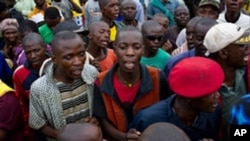Electoral observers from the U.S.-based Carter Center say presidential results in the Democratic Republic of Congo were "mismanaged," compromising the integrity of a vote that gave President Joseph Kabila another five years in power. The leading opposition candidate is rejecting the poll.
Results announced by Congo's electoral commission show the long-time opposition candidate Etienne Tshisekedi losing to President Joseph Kabila by more than three million votes.
Electoral observers from the U.S.-based Carter Center are calling into question the integrity of that vote because of what they say were wide variations in the quality of vote counting.
David Pottie, the associate director of the Carter Center democracy program, says President Kabila was widely expected to do well in the southern Katanga province. What is unusual is how well he did there, receiving more than 90 percent of the vote in at least eight constituencies, where turn out at some polling stations was 100 percent, and not a single ballot was lost.
"This coincidence of really these three factors stretches the rules of probability," he said. "It is just not going to occur naturally that every single registered voter will turn up. That they are all healthy on election day. They are all mobile or indeed that they will all vote in such perfect alignment for a single candidate."
Pottie says Carter Center observers also saw what he calls "great amounts of confusion" at vote counting centers in the cities of Lubumbashi and Kinshasa. Nationwide, results from more than 3,000 polling stations were lost, representing as many as 1.2 million voters.
"These are not necessarily people who all would have gone to the polls, but it does show a really serious problem in the physical collection, the security of the sensitive ballot materials," he said. "And ultimately represents a disenfranchisement of those who did vote. The question that almost always gets asked then is, Do these irregularities change the final results?"
While Pottie says these results lack credibility, the Carter Center has not seen enough to determine whether the irregularities denied Mr. Tshisekedi the win.
"The overall credibility of the results process really does get cast into doubt when one observers such a variety and systemic set of irregularities. That does not mean, and we are not able to say at this point, whether that affects the finishing order of the candidates. But it does really call into question, and should call into question, the integrity of this results process writ large," said Pottie.
Mr. Tshisekedi is rejecting the vote results and has declared himself president, calling for the international community to step in to prevent what he says could be "another bloodbath on Congolese territory."
President Kabila's information minister Lambert Mende, says Mr. Tshisekedi's self-proclamation as president violates the constitution and is creating a climate of fear in Congo.
Observers Question Integrity of DRC Vote




